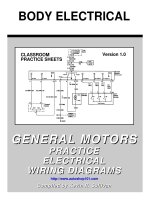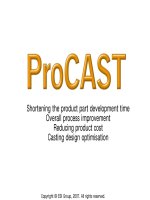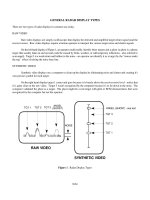ProCAST General Presentation
Bạn đang xem bản rút gọn của tài liệu. Xem và tải ngay bản đầy đủ của tài liệu tại đây (6.52 MB, 59 trang )
Shortening the product part development time
Overall process improvement
Reducing product cost
Casting design optimisation
Copyright © ESI Group, 2007. All rights reserved.
Outline
•
•
•
Introduction
Typical Casting Defects Prediction
Case Study 1 – Al HPDC
– Complete HPDC Process Simulation (cycling, shot piston, filling, solidification,
stress, APM, Value Chain) - NADCA case
•
Case Study 2 – Al HPDC
– Improper mould filling in a multi-cavity steel die
– Gas porosity problem
•
Case Study 3 – Al HPDC
– Improper mould filling in a multi-cavity steel die
•
Case Study 4 – Steel Investment Casting
– Gas and shrinkage porosity were observed in the initial design of the cast freight
trailer component.
•
Case Study 5 – Steel Sand Casting
– Primary & secondary shrink porosity in critical areas
•
Case Study 6 – Steel Sand Casting
– Improving yield by reducing pouring weight
– Reducing machining cost
ã
Conclusion
Copyright â ESI Group, 2007. All rights reserved.
Statement
ProCAST is the leading FEM foundry simulation software, which
provides coupled thermal-flow-stress analysis, along with
unique metallurgical capabilities, for all casting
processes and castable alloys.
• Proven Success of ProCAST 2005 Helps ESI Group Pick Up
2006 Frost & Sullivan European Technology Leadership of
the Year Award
Copyright © ESI Group, 2007. All rights reserved.
Modular Program
Courtesy of ACTECH GmBH, Germany
Al Sand Casting
Courtesy of FOMET SpA, Italy
Al Tilt Gravity Die Casting
Courtesy of Kovolis Hedvikov Czech Republic
Al High Pressure Die Casting
Ni NGV Investment Casting
Courtesy of MAN, Germany
Cast Iron Sand Casting
Courtesy of CMS, Turkey
Al Low Pressure Die Casting
Al Direct Chill Casting
Copyright © ESI Group, 2007. All rights reserved.
ProCAST In Action
Copyright © ESI Group, 2007. All rights reserved.
Geometry & Meshing
•
Utilises the Finite Element Method (FEM)
–
•
Most accurate geometry description and analytic procedure
Easy to import geometry from all CAD systems
–
Accepts: - One of the following CAD file format:
•
•
•
•
•
•
•
•
–
Acis
Cadds
Catia
Pro-Engineer
SolidEdge
SolidWorks
Unigraphics
VDA
Or one of the standard exchanges CAD file format:
•
•
•
–
–
–
–
Native (.sat) file
Native (.pd) file
Native V4 (.model, .dlv, .exp)
or V5 (.catpart) file
Native (.prt) file
Native (.par) file
Native (.sldprt) file
Native (.prt) file
Native (.vda) file
Parasolids (.x_t, .xmt_txt) file
Neutral IGES (.igs) file with trimmed surfaces
Neutral STEP (.step) file
Direct FEM mesh import and export:
I-DEAS, PATRAN, ANSYS, ARIES, ANVIL
Coincident or non-coincident meshes
Automatic 3-D mesh generation
Export to other CAE packages
•
User Friendly menu driven interface
•
Platform flexibility
–
Windows, Linux – 32 and 64 bits
Copyright © ESI Group, 2007. All rights reserved.
Material Properties
AlSi5% / AlSi12.6
Al-Si 12.6%
solid
Al-Si 5%
liquid
solid
Copyright © ESI Group, 2007. All rights reserved.
liquid
Material Properties
Complex phase diagrams
?
A thermodynamic
database is necessary !
Copyright © ESI Group, 2007. All rights reserved.
Material Properties
Database
• Standard Materials Included with Procast
– 116 Metals and Alloys
– 20 Other Materials (Sand, Refractory, Foam, Air,
Water)
• Thermodynamic Material Databases Available
– Alloy families: Al, Fe, Mg, Ni, Cu and Ti
– Thermo Physical properties predicted for the actual
chemistry of your specific or proprietary alloy.
Copyright © ESI Group, 2007. All rights reserved.
Material Properties
Thermodynamic Material Databases
Thermo-physical data
automatically set up from
the chemical composition
(Al, Cu, Fe, Ni, Ti, Mg
based)
Calculationthermodynamic solver
Set up the chemical composition
Run the of the solidification path
Copyright © ESI Group, 2007. All rights reserved.
Advanced Features
Coupled Thermal-Stress
Deformation
(Temperature)
Displacement magnitude : *10
Deformation
Distortion - Elastic springback
after dividing part & gating
Copyright © ESI Group, 2007. All rights reserved.
Advanced Features
Automatic Shell Generation
Shell Mold can be automatically created/calculated from the part definition
Casting
Shell
Mesh
Copyright © ESI Group, 2007. All rights reserved.
Advanced Features
Grain Prediction – Directional
Solidification (DS)
DS
Directionally solidified
columnar grains
(Courtesy of SNECMA, France)
Copyright © ESI Group, 2007. All rights reserved.
Rolls Royce presentation at the
EUROPAM 2006
Copyright © ESI Group, 2007. All rights reserved.
• Density of
metals vs.
temperature is
not constant:
Density, Kg/m3
Predicting Solidification Defect in
Al HPDC– Shrinkage Porosity
Temperature, °C
Feeding problems
during solidification:
Courtesy of Kovolit, CZ
Al HPDC
Copyright © ESI Group, 2007. All rights reserved.
Predicting Solidification Defect in
Cast Iron Sand Gravity– Cold Shot
Copyright © ESI Group, 2007. All rights reserved.
Predicting Filling Defect in
Zn HPDC–Die Erosion
Copyright © ESI Group, 2007. All rights reserved.
Predicting Filling in
Zn HPDC–Interrupted shot
Copyright © ESI Group, 2007. All rights reserved.
Predicting Filling in
Al Sand Casting-Coldshut prediction
Vacuum forming
Aluminium
Silica Dry
t = 2 mm
h = 400 mm
d = 100 mm
Copyright © ESI Group, 2007. All rights reserved.
Filling Validation
Incomplete filling
Copyright © ESI Group, 2007. All rights reserved.
Filling Validation
Thixocasting validation
Sophia Antipolis, Collot
Magnesium alloy (AZ91):
Copyright © ESI Group, 2007. All rights reserved.
« Standard » Casting Simulation
GEOMETRY
PROCESS
MATERIAL
THERMAL & FLUID
ANALYSIS
THERMODYNAMIC
DATABASES
THERMO PHYSICAL
PROPERTIES
DEFECTS
•FILLING DEFECTS
•SOLIDIFICATION DEFECTS
However, Shrinkage Porosity and Improper Fills are
Important Defects predicted with Thermal And Fluid
Analysis, but They Aren’t the Only Defects in
Casting Processes…
Copyright © ESI Group, 2007. All rights reserved.
“Cylinder” Model – NADCA
Benchmark
HPDC process / A383 Alloy
Copyright © ESI Group, 2007. All rights reserved.
Guideline: Casting Modelling Phases
• Phase 1 : Thermal cycling
• Phase 2 : Filling (with extraction of thermal map at the end of cycling)
• Phase 3 : Solidification (coupled with filling)
• Phase 4 : Shrinkage and gas porosity
• Phase 5 : Stress (coupled with filling and solidification)
• Phase 6 : Microstructure and Mechanical Prop.
Copyright © ESI Group, 2007. All rights reserved.
Heat Up Cycles
• 15 Cycles Performed to
Ensure Die Soak (Cavity
Region Soaked in About
9, When Starting at 200
F)
• Regions Which Stay
Warm are Indicated.
Copyright © ESI Group, 2007. All rights reserved.









